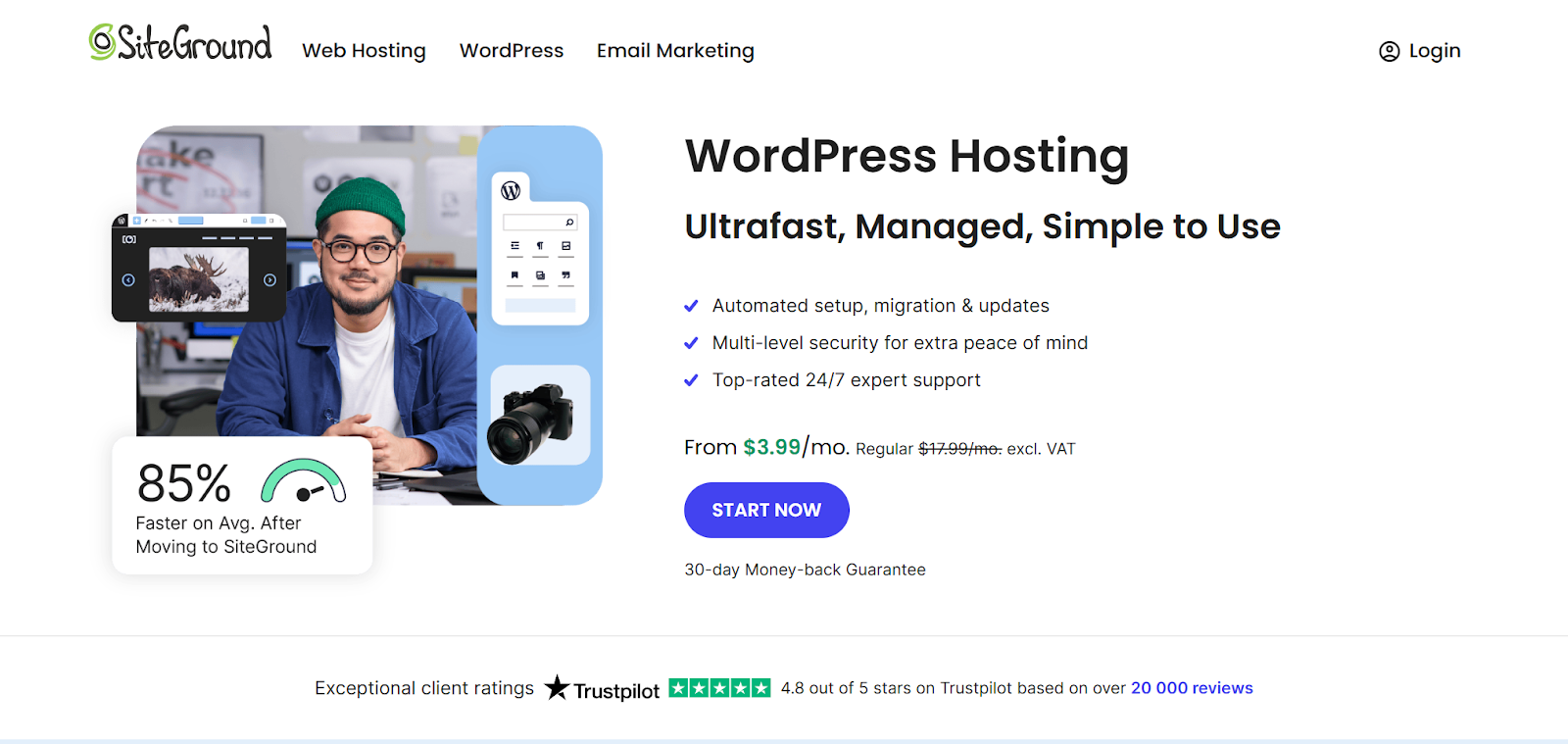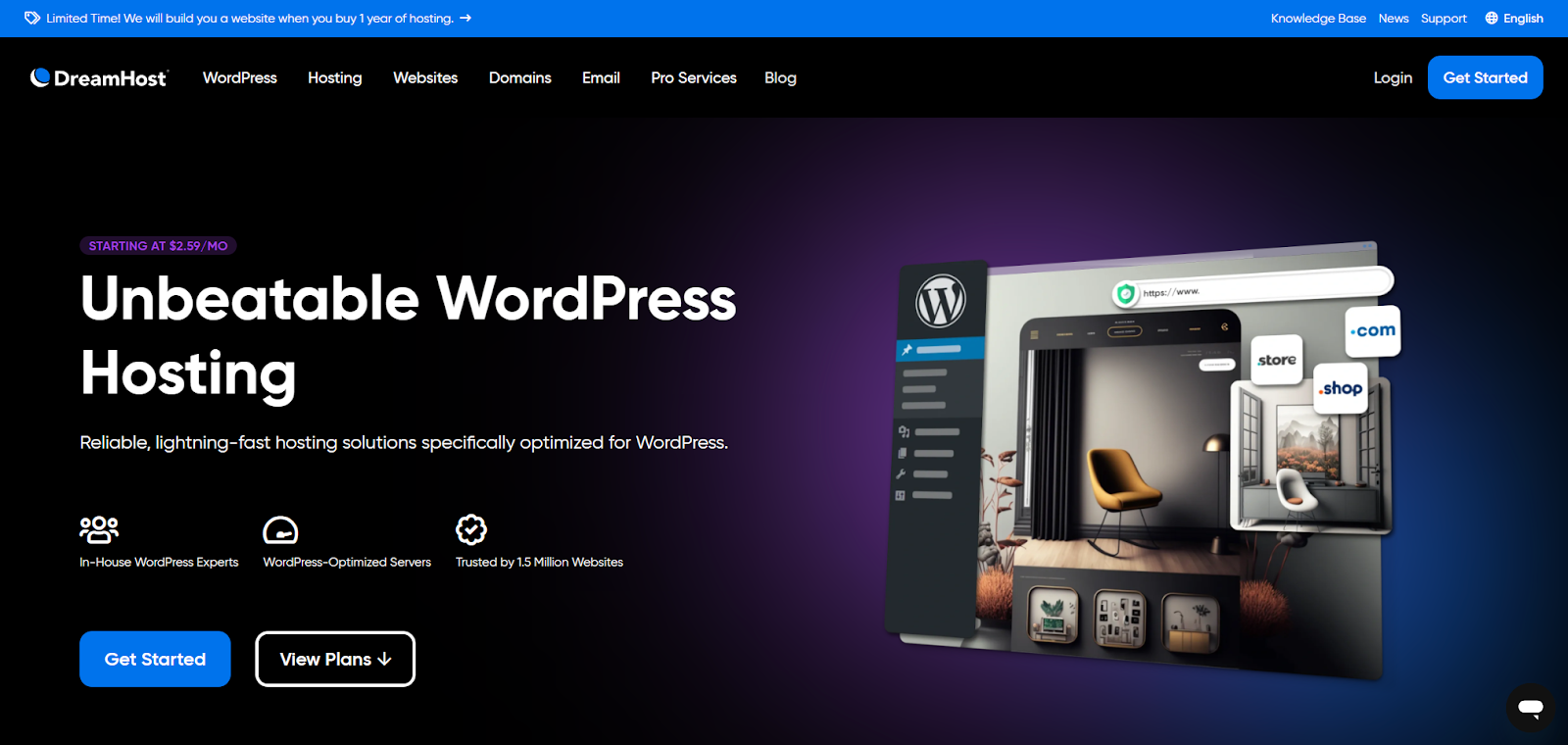Table of Contents
Choosing the right web hosting provider feels like laying the foundation for your house. Get it right, and you have a stable, secure base to build upon. Get it wrong, and you might face constant headaches. For anyone building websites, especially with powerful tools like WordPress and Elementor, the hosting choice directly impacts site speed, reliability, and even security. With so many options out there, how do you pick the best fit?
This article compares three popular choices: SiteGround, DreamHost, and the integrated Elementor Hosting solution. Let’s explore what each offers in 2026.
SiteGround vs DreamHost vs Elementor Hosting: Feature Deep Dive 2026
Making an informed decision means looking closely at what each provider brings to the table. We’ll break down their core focus, features, performance aspects, support, and things to keep in mind.
Elementor Hosting: The All-in-One Solution for Elementor Sites
Core Focus/Best For:
Elementor Hosting aims to provide a seamless, optimized experience specifically for websites built with WordPress and the Elementor page builder. It’s designed for users who value integration, ease of use, and performance tuned for the Elementor ecosystem. It’s great for designers, businesses, and agencies using Elementor.
Key Features:
- Managed WordPress Environment: Handles many technical aspects like core updates and server maintenance.
- Google Cloud Platform: Built on Google’s robust C2 infrastructure, known for performance.
- NVMe SSD Storage: Offers the latest in fast storage technology across plans (storage amounts vary: 5GB Lite, 10GB Basic, up to 80GB Scale/Ultimate).
- Integrated CDN by Cloudflare: Helps speed up content delivery globally.
- Free SSL Certificate: Essential for security (HTTPS).
- Automatic Daily Backups: Provides peace of mind (retention varies: 1 day Lite, 14 days Basic, 30 days Business+). On-demand backups are available on Basic+.
- Staging Environment: Available on Business plans and higher, allowing safe testing before pushing changes live.
- Site Cloning: Available on Grow plans and higher.
- Elementor Core Included: Comes with the foundational Elementor plugin pre-installed. (Note: Elementor Pro builder is a separate purchase).
- Custom Dashboard: Provides easy access to WordPress, Elementor editing, and site management tools.
- Free Migration: Offers tools and services (like Migrate Guru partnership) to help move your existing site.
- Free Domain (First Year): Included with annual plans.
Performance & Reliability:
Backed by Google Cloud and Cloudflare CDN, Elementor Hosting targets high performance and guarantees 99.9% uptime. The use of NVMe SSDs contributes significantly to speed.
Support:
Provides 24/7 support via live chat and ticketing. Premium support tiers are available for higher plans, offering potentially faster responses and more expert help. A knowledge base and tutorials are also available.
SiteGround: Performance-Focused with Strong Support

Core Focus/Best For:
SiteGround is known for its focus on speed, reliable uptime, and highly-regarded customer support. It’s a strong contender for users who prioritize performance and expert help, from beginners to more experienced developers managing serious projects.
Key Features:
- WordPress Optimized Plans: Offers hosting specifically tuned for WordPress.
- Custom Control Panel (Site Tools): A modern, user-friendly alternative to cPanel.
- SSD Storage: Uses solid-state drives across all plans (webspace varies by plan).
- Free CDN Integration: Easily integrates with Cloudflare’s free CDN.
- Custom Caching (SG Optimizer): SiteGround’s proprietary plugin helps improve site speed (basic caching on StartUp, advanced options on GrowBig+).
- Free SSL Certificates: Provided via Let’s Encrypt.
- Automatic Daily Backups: Keeps 30 days of backups. On-demand backups are available on GrowBig and GoGeek plans.
- Staging Tool: Included with GrowBig and GoGeek plans for testing changes.
- Collaborator Access: Allows you to grant access to developers or clients easily.
- Global Data Centers: Servers located in the USA, Europe, Asia, and Australia.
Performance & Reliability:
SiteGround consistently earns praise for excellent uptime (often near 100%) and fast loading speeds, aided by their SSDs, SG Optimizer caching, and global server presence. They do not limit traffic on shared plans.
Support:
Offers 24/7 support through live chat, phone, and tickets. Their support team is known for being knowledgeable, especially with WordPress issues. They also provide extensive tutorials and guides.
DreamHost: Veteran Provider with Flexible Options

Core Focus/Best For:
DreamHost has been around since 1996 and is officially recommended by WordPress.org. They offer a wide range of hosting types and are known for affordable shared hosting, generous policies (like the 97-day money-back guarantee on shared hosting), and a commitment to open source. Good for beginners, budget-conscious users, and those wanting long-term flexibility.
Key Features:
- Variety of Hosting: Offers Shared, Managed WordPress (DreamPress), VPS, and Dedicated servers.
- Custom Control Panel: Uses their own panel, which is clean but different from cPanel.
- SSD Storage: Standard on all plans for better performance.
- Free Domain Name: Included for the first year on annual shared and DreamPress plans.
- Free SSL Certificate: Pre-installed for security.
- Unlimited Traffic/Bandwidth: Featured on shared hosting plans.
- Automated Backups: Daily backups are included.
- One-Click WordPress Install: Makes setup easy.
- Optional Website Builder (Remixer): Available for users who want a simple drag-and-drop builder.
Performance & Reliability:
DreamHost provides solid performance with SSDs and promises a 100% uptime guarantee for most plans (with compensation if they fall short). Server response times are generally good, though some tests show room for improvement compared to top-tier providers.
Support:
Offers 24/7 email and ticket support. Live chat is available but typically restricted to business hours. Phone support is not standard on shared plans but can be added or is included in higher tiers (like DreamPress). They have a comprehensive knowledge base and active community forums.
Choosing Your Ideal Host: Key Factors
Comparing features is one thing, but how do you match a host to your specific needs? Let’s break down the critical decision points.
Matching Hosting to Your WordPress/WooCommerce Site
Think about your website’s purpose. A simple blog has different needs than a complex eCommerce store running WooCommerce or a portfolio site heavy with images built using Elementor.
- Resource Needs: Estimate your traffic (monthly visits), required storage space (for files, themes, plugins, images, backups), and how resource-intensive your site is. Elementor sites, especially complex ones, can require more server resources (RAM, CPU) for smooth performance.
- Managed vs. Unmanaged: Managed hosting (like Elementor Hosting, SiteGround’s WordPress plans, DreamPress) handles updates, security, and optimization for you. This is great for beginners or those who prefer hands-off maintenance. Unmanaged options offer more control but require technical expertise.
Planning for Growth (Scalability)
Your site might be small now, but what about next year? Choose a host that makes it easy to grow.
- Upgrade Paths: Check how simple it is to move to a higher plan (e.g., from shared to VPS or a bigger managed plan) without significant downtime or complex migrations.
- Resource Flexibility: Cloud-based hosting (like Elementor Hosting on Google Cloud or SiteGround’s cloud options) often handles traffic spikes better and allows for easier resource scaling.
Budgeting: Beyond the Intro Price
Hosting costs can vary wildly. Look beyond the initial promotional offer.
- Introductory vs. Renewal Rates: Be aware of significant price jumps after the first term (a common practice, especially noted with SiteGround). Factor the regular price into your long-term budget.
- Included Value: Consider what’s included for free (domain, SSL, CDN, migration, backups, email accounts) versus what might be paid add-ons. Elementor Hosting, for instance, bundles its optimized environment. DreamHost offers a free domain and unlimited bandwidth on shared plans. SiteGround often includes migration tools.
Performance Essentials: Speed and Reliability
Nobody likes a slow or unavailable website. These factors are crucial.
- Uptime Guarantee: Look for guarantees of 99.9% or higher. This indicates the provider’s confidence in their infrastructure reliability. Both Elementor Hosting and SiteGround offer 99.9%+, while DreamHost boldly claims 100% on some plans.
- Server Technology: NVMe SSDs offer the fastest storage currently available, leading to quicker load times compared to older SATA SSDs or traditional HDDs. Elementor Hosting utilizes NVMe. SiteGround also incorporates fast SSD technology. DreamHost uses SSDs.
- Content Delivery Network (CDN): A CDN stores copies of your site in multiple global locations, delivering content from the server closest to the visitor. This drastically improves loading speed for international audiences. Elementor Hosting includes Cloudflare. SiteGround offers easy Cloudflare integration. Using a CDN with DreamHost is recommended, especially for non-US audiences.
Support & Management: Help When You Need It
When things go wrong, accessible and knowledgeable support is invaluable.
- Availability: Is support available 24/7? Via which channels (live chat, phone, email/ticket)? Consider your preferred contact method and time zone. SiteGround and Elementor Hosting offer 24/7 chat/ticket. DreamHost’s live chat is more limited.
- Expertise: Does the support team understand WordPress and potentially tools like Elementor? Managed WordPress hosts often have specialized teams.
- Control Panel: Is the hosting control panel intuitive and easy to use? SiteGround and DreamHost use custom panels, while Elementor Hosting provides its own dashboard integrated with WordPress management. Ease of use is subjective but important for managing domains, emails, backups, and databases.
Making the Switch: Hosting Migration Tips
Moving your website to a new host can feel daunting, but planning makes it smoother.
- Understand the Steps: Migrating typically involves transferring your website files (WordPress core, themes, plugins, uploads) and your database.
- Handle Your Domain: You will need to update your domain’s DNS settings to point to the new host’s servers. This process (propagation) can take a few hours up to 48 hours.
- Consider Email Hosting: Decide if you will host your email with your new web host or use a third-party service like Google Workspace or Microsoft 365. Some entry-level plans (like DreamHost Shared Starter) might not include email.
- Prevent Downtime: Plan the migration during off-peak hours. Use migration plugins or services offered by the host (like Elementor Hosting’s free migration or SiteGround’s migrator tool). These often minimize downtime. Test thoroughly before pointing your domain.
- Use Migration Tools: Many hosts offer free or paid migration services or user-friendly plugins (like Migrate Guru, Duplicator, WP Migrate DB) to simplify the process.
Keeping Your Site Secure: Hosting Security Essentials
Website security is not optional. While you play a role, your hosting provider is your first line of defense. Look for hosts that prioritize security.
- Foundational Layers:
- SSL/HTTPS: Encrypts data between your site and visitors. Every reputable host (including Elementor, SiteGround, DreamHost) provides free SSL certificates. Ensure it is active.
- Firewalls (WAF): A Web Application Firewall filters malicious traffic before it hits your site, blocking common attacks. Elementor Hosting and SiteGround explicitly mention WAFs. Look for this feature.
- Regular Updates & Backups: Keeping server software, WordPress, themes, and plugins updated patches vulnerabilities. Reliable, automatic backups (offered by all three providers) are crucial for recovery if something goes wrong. Check backup frequency and retention period.
- Proactive Measures:
- Malware Scanning: Regular scans help detect and remove malicious code. Check if your host offers this.
- Secure Protocols: Use SFTP (Secure File Transfer Protocol) instead of FTP for transferring files. Most quality hosts support SFTP.
- Access Control: Use strong, unique passwords for everything (hosting account, WordPress admin, databases). Enable Two-Factor Authentication (2FA) wherever possible. Limit admin access to only necessary users.
- Provider Responsibility:
- Secure Data Centers: Hosts should use physically secure data centers with redundancy and monitoring.
- Security Monitoring: Continuous monitoring helps detect and respond to threats quickly. Elementor Hosting highlights its 24/7 monitoring.
What’s on the Horizon for Web Hosting?
The hosting industry constantly evolves. Keep an eye on these trends:
- AI & Automation: Artificial intelligence is increasingly used for optimizing server performance, automating resource allocation, enhancing security threat detection, and even assisting customer support.
- Green Hosting: Sustainability is becoming more important. Providers are focusing on using renewable energy sources, energy-efficient hardware, and reducing their carbon footprint. DreamHost mentions its commitment to sustainability.
- Enhanced Security: Expect even more focus on proactive security measures, potentially including Zero-Trust security models that verify every access request, not just those from outside the network.
Conclusion
Choosing between Elementor Hosting, SiteGround, and DreamHost in 2026 depends entirely on your priorities.
- Choose Elementor Hosting if: You heavily use Elementor, value seamless integration, want a managed environment optimized for performance within that ecosystem, and prefer an all-in-one solution built on robust cloud infrastructure.
- Choose SiteGround if: Top-tier performance, exceptional uptime, and knowledgeable 24/7 support are your main concerns, and you are prepared for higher renewal costs after the initial term. Its custom tools and focus on WordPress make it a strong all-around choice.
- Choose DreamHost if: You need affordable and reliable shared hosting with generous policies (bandwidth, money-back guarantee), value a long-standing company recommended by WordPress.org, and are comfortable with a custom panel and potentially less immediate support options on lower tiers.
No single host is universally “the best.” Evaluate your website’s specific needs, your technical comfort level, your budget (long-term!), and the importance of factors like speed, support, and scalability. By carefully considering these points and the features offered by each provider, you can confidently select the hosting foundation that will best support your website’s success.
Looking for fresh content?
By entering your email, you agree to receive Elementor emails, including marketing emails,
and agree to our Terms & Conditions and Privacy Policy.





